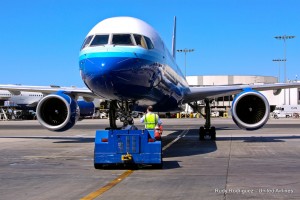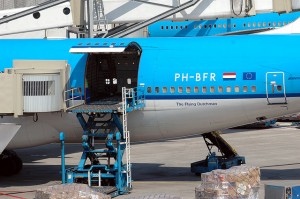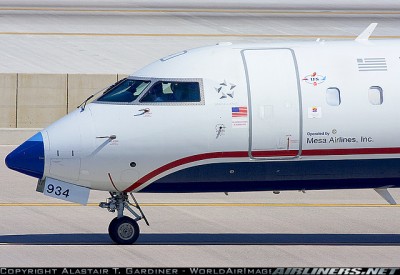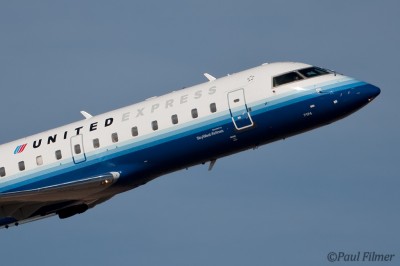
Airports can be great places to hang out at after you get through security.
The last few years, the more I fly, the more I see body scanners. To date, even though many airports I travel to and from have body scanners, I have been able to avoid them — and pat-downs as well.
Don’t get me wrong. I am not about making a huge stand and doing whatever I can to avoid them. I just do what any normal passenger might try to avoid an additional delay at the airport.
Most of the time I fly out of Seattle-Tacoma International airport (SEA), where they have three main check points. At each check point there are multiple security lines and each line has access to a body scanner. Problem is, on many occasions there will be multiple lines open, but only one body scanner active.
A TSA agent will check my ID and boarding pass and then I have the ability to choose which security line I want. Of course, I choose a line that does not have a body scanner active and viola I have avoided the $150,000.00 high-tech scanner.
I have noticed at some airports there will be a second TSA employee telling you which line to go in, but often this person is missing or also easy to ignore if one wanted to. Could the TSA demand you go to line #1 with the body scanners and then escort you over? Sure, but that is a pretty embarrassing situation to put a person in, especially if it ends up being only people of a certain race.
This is not a big deal if someone who means airlines no harm can avoid the body scanners, but it would be just as easy for someone wanting to do harm. Take away all the privacy and health concerns; what is the point of spending all this money for the machines, training, and man-power to “keep us all safe,” if they can be consistently avoided? My father always told me, “if you are going to do something, do it right.” Sure, I didn’t always listen as a kid, but I think it is good advice for the TSA — I only hope they are listening.
How have your experiences with the body scanners gone? Have you noticed the same lack of consistency?

United Airlines Boeing 757 at LAX
In April, the LA Times posted an anti-airline story that got me going. Now, the Washington Times has the airline business all wrong and I can’t stay silent. Armstrong Williams, who wrote the story, seems to mostly be a political correspondent, but decided to use his experience of flying to talk about the airline biz.
In a nutshell, Williams argues that airlines are in a race to the bottom. That they are some how all working together to provide the worse service possible to passengers, while earning the most money possible. Many of his arguments are weak and mis-informed, but they seem to be common arguments you see in the media against airlines. I think it is time to stand up to some of these points:
WILLIAMS:
No, the blame lies squarely on the shoulders of the airlines. Also, the utter agony and different standards for every airport of what can and can’t pass through security screening is baffling.
MY RESPONSE:
Wait, how can the blame solely land on the airlines, but it also sucks at the airports? This is the only mention of hating on something other than the airlines, but he doesn’t mention that airport security has nothing to do with the airlines and everything to do with the US government. At least we can both agree that airport security is slacking.
WILLIAMS:
When do you last recall getting a meal or a cup of coffee without having to hand the flight attendant a major credit card? The seats are smaller, more uncomfortable, certainly more dirty than they have ever been… Want a blanket? That’s $5, please. Want to watch TV? Another $5, please.
MY RESPONSE:
Ah, the common argument that the airlines are packing the people in and charging for everything. Those evil, evil airlines, right? What Williams forgets to mention is the drop of average airfare for people flying around the country. Plus, food, drink, blankets, in-flight entertainment all cost the airlines money. If I do not want these amenities, why should I pay for them in my airfare? Sounds like Williams wants the cheaper fares and all those amenities that used to come free with lower fares.
WILLIAMS:
I’ve flown to New York only twice from D.C. since 9/11, and the Acela train is my only mode of transportation to and from the Big Apple. The Acela is truly a rare gift from heaven and Earth when you think hard and long about future travel plans.
MY RESPONSE:
We agree here — partly. I think taking the train to many east coast destinations makes sense. No big check-in process, no TSA and less hassle. Odd how Williams doesn’t seem to mention that meals in First Class on the Acela line is free, but people not in First Class have to pay for their food. Why doesn’t he get upset that he doesn’t get free food and drinks on the train, yet expects it in the air?
WILLIAMS:
To add insult to injury, major air carriers either don’t seem to notice the plight of travelers or don’t seem to care. What they care most about is fleecing your wallet for the cost of your airline ticket.
MY RESPONSE:
Why do so many people feel that airlines are not caring about the passengers? Sure, there might be some airlines that are less about a passenger’s well being versus profit, but surely not all of them. Plus I think Williams and many others forget that airlines are not charities. They are in the business to make profit and grow. Making profit (which has been difficult for many years for airlines) is not a bad thing and shouldn’t be treated like it. There is a lot of competition between airlines and if you do not like how an airline does something, do not fly them. However, you might find that cost of your ticket and level of service might be closely related — are you willing to pay more?
WILLIAMS:
When oil spiked at more than $155 per barrel years ago, airlines were first in line to complain they were going under if they couldn’t increase fares. They added surcharges for baggage to help defray the costs of the additional fuel. Today, oil is hovering around half the price of its all-time highs. Are the baggage fees gone? Heck, no.
MY RESPONSE:
Airlines lost a lot of money with 9/11 and the high oil prices and many went into debt or filed for bankruptcy. Although at this point most airlines are doing quite well, they need to pay back their previous debts. I have no misconceptions that these fees would go away. If passengers keep paying them, why should airlines remove them? Airlines do not function in a vacuum and just make up fees that hurt their business. Passengers continue to pay them and airlines make money off them.
WILLIAMS (quote from an AOL travel article he uses):
“But what you may not know is airlines are now considering flying during the holidays a privilege, and have instituted a surcharge for traveling on peak days. This ‘premium’ fee of $10 to $30 is added to the cost of your ticket if you fly throughout much of December and the beginning of January. Be wary of deceptively cheap fares, as these tickets are often driven up by add-on fees for holiday air travel.”
MY RESPONSE:
Supply and demand. Why the heck wouldn’t airlines charge more for tickets during busy times versus non-busy times? It is about being a smart traveler. Watch your final costs and make sure they are what you were expecting. That goes with any business.
WILLIAMS:
Signs now warn, “Doors close promptly 10 minutes before takeoff” so carriers can cancel seat assignments for confirmed passengers and offer them to standby passengers. At the same time, flight delays are at near-record highs, with average lapses inching toward hours, not minutes.
MY RESPONSE:
Wrong! Did he even look at airline delay statistics before writing this (I can tell you no, actually read-on he admits he didn’t either)? In 2010 there were more on-time flights seen since 2003. I am sure if Williams was a stand-by passenger waiting to get home early to his family, he might have a different opinion. Airlines do not have boarding rules just to screw over passengers. It is to make sure that planes leave on time so they do not get delayed and upset more passengers.
WILLIAMS:
Come to think of it, have you noticed that all the airlines seem to have adopted their own “race to the bottom”?
MY RESPONSE:
No, I have not. I have seen new low cost airlines offering amenities like LiveTV and in-flight internet. Heck even the legacy airlines are starting to provide more amenities to passengers to keep up with the smaller airlines. Airlines are trying to give passengers what they want: cheap prices and amenities, which is a difficult combination.
WILLIAMS:
Maybe I’m just complaining. I haven’t really offered statistics or any economic models to support my claims. But do I really need to?
MY RESPONSE:
Yes Williams, you do need to. I know I am “only” a blogger, but I surely do not post things that are inaccurate (at least I try not to and quickly update when it is pointed out to me). I prefer not to just join in common hype against airlines and spread hatred for an industry that doesn’t deserve it.
WILLIAMS:
I still take flights that make a refugee camp look like Club Med in terms of seating. I still have to pay resort-style prices for quickie-mart quality food.
MY RESPONSE:
Seriously? I am pretty sure that millions of people who have had to live in a refugee camp to survive would have a VERY different opinion than you. The amount of room you now have in airlines (compared to years ago) is directly related to consumer’s demands for lower fares. If you can fit in more seats, you can charge less per seat and still make more profit. If you want an airline experience like it used to be, pay for First Class. You will find the cost of a First Class ticket now is pretty comparable to what economy tickets used to be during what many people see as the “golden age” of airline travel.
Okay, I think I feel a bit better at least. Even though it seems obvious that Williams is misinformed and just doesn’t care, it bothers me since so many will share his opinion. I wish more people would take the time to learn about the industry before hating on it. I plan to email Williams and connect via Twitter, hoping he can learn a bit more about the airline business. If he responds, I will be sure to post an update, but I do not have high expectations.

Is this plane going to the US? TSA says no printer cartridges allowed -- gotta protect America.
I am angry and frustrated at the Transportation Security Administration (TSA) and the Department of Homeland Security (DHS) right now. In classic form they have once again over-reacted in an idiotic fashion. I am not saying the recent mailing of bombs in printer cartridges across the world is not serious, but it demands real solutions, not knee-jerk reactions.
In a statement released by the DHS, they state that they are banning all cargo from Yeman. Okay, this makes sense. It is not like we have a lot of imported goods coming from Yemen. However, they are also banning cargo from Somalia. I will give them the benefit of the doubt and assume they have some intelligence that we do not know about. The release also states, “No high risk cargo will be allowed on passenger aircraft.” Okay, so far I am actually with the TSA here. Banning dangerous cargo from certain places in the world until we can figure out the risk actually kind of makes sense.
When reading, I assumed we must be talking about dangerous things like explosives, flammable items and bombs right? Think again. In the next sentence they continue with, “Toner and ink cartridges over 16 ounces will be prohibited on passenger aircraft in both carry-on bags and checked bags on domestic and international flights in-bound to the United States.” Say what?
This is stupid. I hate to call anyone names, but there is just no other way to say it. This no-thought reaction actually makes me feel less safe. This is telling me that the TSA cannot detect a bomb no matter what form it takes. Do they think that terrorist will give up since they can’t figure out anything else to put bombs in? Please. Not that I think there are a heck of a lot of people carrying around large printer cartridges in their baggage, but what’s next?
Since the ban is sort of a shock, you might have missed the part where this is only for flights within and inbound to the United States. So, it is totally fine to fly with a printer cartridge on an airline departing the US, you just can’t bring any back. What sense does that make?
It is easy to ban printer cartridges since they are not common, but what if terrorists start using items that would be difficult to ban? Would the TSA start banning laptops or stuffed animals if terrorists start using them? I wish the TSA would stop wasting time and money with pointless security measures like this. They need to be honest with the public that there is no 100% solution and be smarter about bomb detection. The airline business has seen many good and horrid changes since 9/11. However, in the last nine years 0 Americans have died from terrorism on airlines. Compare that to the about 315,000 Americans who have died in automobile accidents over the same period of time. Some might say that scanning shoes and your toothpaste is related to those 0 deaths, but I say it has more to do with this not being the huge threat the TSA and the media like to play it up to be.
When I got word of this story a few days ago, I tried to contact two different TSA sources, but no one would contact me back (and I was not this snarky). The TSA is proud of their “Talk to the TSA” campaign, but I guess you can only talk to them about stuff they want to talk about. I have tried to get the TSA’s side to things, but they just don’t seem to want to talk, which is greatly disappointing to me. If you are not happy with the body scanners and their crazy knee-jerk reactions, I highly suggest you trying to talk to the TSA. If you get a reply, let me know.

US Airways CRJ-900 with United Airlines nose, operated by Mesa Airlines. Photo by Alastair T. Gardiner.
There are a lot of regional airlines out there. Most are independently operated and contracted out to larger carriers. In most cases, the regional carrier will wear the livery of the larger airline and flying under a capacity purchase agreement.
This relationship is well known to many of us airline nerds, but most of the general public might have a basic idea, but see them as the same airline.
Most regionals are flying just using a bigger airline’s brand. In many cases there are more than one regional airline flying under the same legacy airline’s brand. For example there are nine individual regional airlines currently flying under the same “United Express” brand. When most passengers see “United” or “United Express” they come to expect the same level of service, even if technically the same airline is not flying them.
For me, it is that brand the airline wears that makes all the difference. I have blogged about quite a few instances where employees of a regional airline screw up. When bad things happen with a regional airline, I question whether I should just blame the contracted airline or the legacy carrier whose name is on the side. In most cases I decide to point out that it is a regional airline, contracted out, but blame the legacy carrier.
I have had quite a few people disagree with me on this, even take offense. I can understand the frustration, but the legacy carrier has decided to put their name on the side of the regional carrier’s plane and people expect a certain level of service. The legacy airline’s name is on the ticket, reserved off their site and the employees wear their name tags. As you enter a regional plane, you might noticed the “Operated by ______”, but most people won’t. When the average Joe flies on a regional airline, they feel and expect it is just like them flying on the legacy carrier and I feel the legacy carrier is responsible for the service received.

United Express CRJ operated by Skywest Airlines.Photo by Paul Filmer
When an airline puts their name on something, it is putting their seal of approval for the way they do business. If a passenger has a horrible experience flying on US Airways Express operated by Mesa Airlines, do you think they will be say, “I am never flying Mesa Airlines again?” Of course not, they will blame it on the parent company, US Airways.
Some might think my opinion enforces most passengers’ ignorance to the differences between regionals and their legacy counterparts, but I feel it is important that the legacy airlines hold a lot of responsibility for the actions of employees wearing their uniforms and flying in their colors.
Let’s face it, the use of regional carriers is probably going to continue to grow. Personally, I enjoy the smaller aircraft experience, even when I know most passengers don’t. The reality is it is more cost effective to fly smaller planes and routes where you used to see Boeing 737’s or Airbus A320’s you are starting to see regional jets and props. Where most passengers complain about the smaller cabins, the regional airlines provide cheaper and service more often to more airports than their legacy carriers can accomplish.
Do you know what airline you will be flying on next time you are on a regional flight? I tried to create a list of smaller airlines that fly under the flag or legacy carriers and it wasn’t easy (let me know if I missed anything):
US Airways Express
* Air Wisconsin
* Mesa Airlines
– PSA Airlines
* Chautauqua Airlines
– Piedmont Airlines
* Republic Airlines
* Colgan Air
* Trans States Airlines
Delta Connection
* Atlantic Southest Airlines
– Comair
* Pinnacle Airlines
* Skywest
* Chautauqua Airlines
* Shuttle America
* Freedom Airlines
* Skywest Airlines
Continental Express
* Chautauqua Airlines
* ExpressJet
United Express
* Mesa Airlines
* Atlantic Southeast Airlines
* Chautauqua Airlines
* Republic Airlines
* Colgan Air
* Shuttle America
* GoJet
* Mesa Airlines
* TransStates Airlines
* Skywest
* ExpressJet
American Eagle
– American Eagle
– Executive Airlines
Note: Airlines in italics (with a “-” in front) are actually owned by the legacy’s parent company
I would like to hear your thoughts on this. How do you perceive regional’s relationship to legacy airlines? Should the airline business make more of a distinction?
Images (both used with permission):
USAirways by Alastair T. Gardiner
United by Paul Filmer
Thanks Court for your help!
UPDATE: Some readers have pointed out some regionals I missed under the legacy headers and I have updated them. Thanks!




